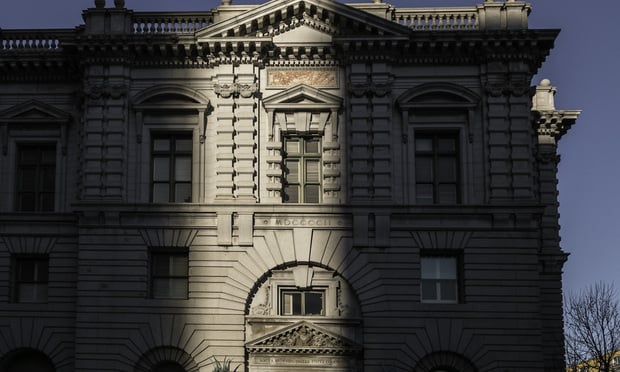9th Circuit OKs Government's Hiring of Law Firms on Contingency
The appellate court on Thursday found that a defendant's due process rights weren't violated when a district attorney in California hired three outside law firms on a contingency basis to pursue a civil lawsuit.
March 16, 2018 at 06:33 PM
5 minute read
 U.S. Court of Appeals for the Ninth Circuit. Photo: Jason Doiy/ALM
U.S. Court of Appeals for the Ninth Circuit. Photo: Jason Doiy/ALM
A California district attorney's hiring of outside law firms on a contingency basis did not violate a defendant's rights to due process, according to the first federal circuit court to address the issue.
In an opinion on Thursday, the U.S. Court of Appeals for the Ninth Circuit upheld the dismissal of a case that American Bankers Management Co. Inc. brought against the district attorney of Trinity County. The district attorney hired three law firms on contingency to pursue injunctive relief and civil penalties against the company under California consumer protection laws. The panel disagreed with American Bankers' contention that the hiring of the law firms violated its due process rights under the Fourteenth Amendment.
“Although civil penalty provisions are common across federal and state enforcement regimes, we are the first circuit to consider whether government officials may, without violating federal due process, retain private counsel on a contingency-fee basis to litigate an action for civil penalties,” wrote Judge Michelle Friedland in the unanimous opinion. Relying on its own 1993 decision in United States ex rel. Kelly v. Boeing, which involved a False Claims Act case, the Ninth Circuit rejected the due process claims.
“Because Kelly held the qui tam provisions of the False Claims Act do not offend due process, and because the contingency fee arrangement here is not meaningfully different from qui tam litigation in terms of the incentives it creates or the power it confers, we hold that the contingency fee arrangement at issue here does not offend due process either,” she wrote.
The three firms were Dallas-based Baron & Budd, Carter Wolden Curtis in Sacramento and Philadelphia's Golomb & Honik. Baron & Budd's Roland Tellis, who argued the case on behalf of the district attorney and the law firms, wrote in an email that the ruling “has put an end to American Bankers' delay tactic.”
“The notion that our contingent fee arrangement with the district attorney somehow violated the due process rights of a major financial institution with unlimited resources was laughable,” he wrote. “The Ninth Circuit's ruling accords with its prior rulings in analogous qui tam actions and with Supreme Court precedent. We look forward to getting the case back on track. Frankly, it is not my contingent fee agreement that should worry the defendants—they should worry about the allegations of their conduct.”
The lawyer who argued for American Bankers, Brian Perryman of Carlton Fields Jorden Burt in Washington, D.C., did not respond to a request for comment.
Challenges over a government's hiring outside counsel have come up in several mass torts, including those involving lead paint and opioids. A footnote in Thursday's opinion acknowledged several state court rulings on the issue, including a New Hampshire ruling that blessed the use of outside lawyers in an opioid case and another in a Rhode Island case against three lead paint companies.
The counties of Santa Clara and San Francisco and the city of San Francisco filed an amicus brief In the American Bankers case. The California communities' own hiring of outside counsel in a lead paint case was reviewed and approved by the California Supreme Court. “These partnerships are one of the critical tools that public law offices use to pursue a broad range of civil law enforcement cases on behalf of the public,” wrote San Francisco Deputy City Attorney Aileen McGrath and Santa Clara Assistant County Counsel Danny Chou. The “sweeping constitutional ban” that American Bankers would impose “threatens to remove this important device from the arsenal government law offices can deploy in their efforts to protect the public.”
The U.S. Chamber of Commerce and The Pharmaceutical Research and Manufacturers of America also filed an amicus brief. John Beisner of Skadden, Arps, Slate, Meagher & Flom pushed for a ban on such “unseemly quid pro quo relationships” that “undermine public confidence in the justice system.”
The American Bankers case started in 2015 when Trinity County District Attorney Eric Heryford hired the three firms to pursue a case alleging that American Bankers and several other financial services firms that allegedly used deceptive marketing to offer “ancillary products,” like protection plans, to California credit cardholders. Under contingency contracts, the firms were to receive 30 percent of recoveries.
The case originally was brought in Trinity County Superior Court, but the district attorney voluntarily dismissed and refiled it in the U.S. District Court for the Eastern District of California. American Bankers moved to dismiss those claims and disqualify the outside law firms.
But the company also fired back with its own suit in the Eastern District of California challenging the contingency fee contracts on constitutional grounds. It said the district attorney's case was more akin to a criminal enforcement action that challenged its First Amendment rights.
In 2016, U.S. District Judge Kimberly Mueller in Sacramento dismissed the case, prompting the appeal.
This content has been archived. It is available through our partners, LexisNexis® and Bloomberg Law.
To view this content, please continue to their sites.
Not a Lexis Subscriber?
Subscribe Now
Not a Bloomberg Law Subscriber?
Subscribe Now
NOT FOR REPRINT
© 2025 ALM Global, LLC, All Rights Reserved. Request academic re-use from www.copyright.com. All other uses, submit a request to [email protected]. For more information visit Asset & Logo Licensing.
You Might Like
View All
Buchalter Hires Longtime Sheppard Mullin Real Estate Partner as Practice Chair

Reality TV Couple and Pacific Palisades Neighbors Sue City of Los Angeles Over Loss of Homes to Fire
3 minute read
In Resolved Lawsuit, Jim Walden Alleged 'Retaliatory' Silencing by X of His Personal Social Media Account

No Two Wildfires Alike: Lawyers Take Different Legal Strategies in California
5 minute readTrending Stories
- 1We the People?
- 2New York-Based Skadden Team Joins White & Case Group in Mexico City for Citigroup Demerger
- 3No Two Wildfires Alike: Lawyers Take Different Legal Strategies in California
- 4Poop-Themed Dog Toy OK as Parody, but Still Tarnished Jack Daniel’s Brand, Court Says
- 5Meet the New President of NY's Association of Trial Court Jurists
Who Got The Work
J. Brugh Lower of Gibbons has entered an appearance for industrial equipment supplier Devco Corporation in a pending trademark infringement lawsuit. The suit, accusing the defendant of selling knock-off Graco products, was filed Dec. 18 in New Jersey District Court by Rivkin Radler on behalf of Graco Inc. and Graco Minnesota. The case, assigned to U.S. District Judge Zahid N. Quraishi, is 3:24-cv-11294, Graco Inc. et al v. Devco Corporation.
Who Got The Work
Rebecca Maller-Stein and Kent A. Yalowitz of Arnold & Porter Kaye Scholer have entered their appearances for Hanaco Venture Capital and its executives, Lior Prosor and David Frankel, in a pending securities lawsuit. The action, filed on Dec. 24 in New York Southern District Court by Zell, Aron & Co. on behalf of Goldeneye Advisors, accuses the defendants of negligently and fraudulently managing the plaintiff's $1 million investment. The case, assigned to U.S. District Judge Vernon S. Broderick, is 1:24-cv-09918, Goldeneye Advisors, LLC v. Hanaco Venture Capital, Ltd. et al.
Who Got The Work
Attorneys from A&O Shearman has stepped in as defense counsel for Toronto-Dominion Bank and other defendants in a pending securities class action. The suit, filed Dec. 11 in New York Southern District Court by Bleichmar Fonti & Auld, accuses the defendants of concealing the bank's 'pervasive' deficiencies in regards to its compliance with the Bank Secrecy Act and the quality of its anti-money laundering controls. The case, assigned to U.S. District Judge Arun Subramanian, is 1:24-cv-09445, Gonzalez v. The Toronto-Dominion Bank et al.
Who Got The Work
Crown Castle International, a Pennsylvania company providing shared communications infrastructure, has turned to Luke D. Wolf of Gordon Rees Scully Mansukhani to fend off a pending breach-of-contract lawsuit. The court action, filed Nov. 25 in Michigan Eastern District Court by Hooper Hathaway PC on behalf of The Town Residences LLC, accuses Crown Castle of failing to transfer approximately $30,000 in utility payments from T-Mobile in breach of a roof-top lease and assignment agreement. The case, assigned to U.S. District Judge Susan K. Declercq, is 2:24-cv-13131, The Town Residences LLC v. T-Mobile US, Inc. et al.
Who Got The Work
Wilfred P. Coronato and Daniel M. Schwartz of McCarter & English have stepped in as defense counsel to Electrolux Home Products Inc. in a pending product liability lawsuit. The court action, filed Nov. 26 in New York Eastern District Court by Poulos Lopiccolo PC and Nagel Rice LLP on behalf of David Stern, alleges that the defendant's refrigerators’ drawers and shelving repeatedly break and fall apart within months after purchase. The case, assigned to U.S. District Judge Joan M. Azrack, is 2:24-cv-08204, Stern v. Electrolux Home Products, Inc.
Featured Firms
Law Offices of Gary Martin Hays & Associates, P.C.
(470) 294-1674
Law Offices of Mark E. Salomone
(857) 444-6468
Smith & Hassler
(713) 739-1250






